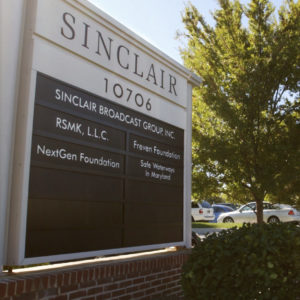The companies at the heart of the Sinclair-Tribune merger shot back at critics of the transaction in arguments posted by the Federal Communications Commission Wednesday, calling them “untethered” from the reality that broadcasters must merge to compete with online video platforms like Netflix.
The arguments come after weeks of comments on the Sinclair-Tribune merger from the likes of Dish Network, T-Mobile, Newsmax, Public Knowledge, and others poured into the FCC asking the agency to deny the merger. The lengthy list of complaints included Sinclair’s post-merger ability to reach 72 percent of U.S. households (far exceeding Congress’s national audience cap of 39 percent), leverage to raise prices for its content, and history of gutting local news rooms in favor of hard-right editorial content.
Sinclair dismissed those comments as “transparent” and “naive” arguments by petitioners “either trying to use this proceeding to stifle competition for [their] own economic interests” or “still living in a pre-cable, pre-internet, pre-smartphone world, untethered from the economic realities of the current media market.”
Chief among Sinclair’s defense is the growing market for online video streaming offered by Netflix, Hulu, Amazon, and others, who’ve gone from transmitting content online to spending billions on developing original content of their own. For broadcasters to survive and compete, Sinclair argues, they’ll have to join forces.
“Today, the local broadcast industry is significantly challenged by declines in its primary revenue stream, local advertising, as well as other profound changes in the media ecosystem . . . such as Apple, Google, Netflix and Facebook, into the programming space,” Sinclair’s filing reads.
The broadcaster notes Apple’s commitment to spend $1 billion on original content in the next year, while Netflix and Amazon plan to spend $7 billion and $4.5 billion. Sinclair, already the largest broadcaster in the U.S., says the market is already so consolidated that any other broadcaster seeking to buy Tribune, the second largest, would run into the same complaints critics have leveled at it.
Beyond the fact over-the-top video distributors like Google aren’t interested in buying a broadcaster, the $3.9 billion Sinclair-Tribune merger would ensure tens of millions who can’t afford a Netflix subscription can still get broadcast television for free, according to the mergees.
Sinclair reasserted that with the UHF discount in place — an outdated technical loophole revived by the Trump administration allowing the combined companies to exceed the national audience cap — the Sinclair-Tribune merger won’t be in violation of FCC rules. Mergees also plan to sell any other stations necessary to comply with rules forbidding ownership of two stations in the same market (though Sinclair’s found ways around those rules before by selling stations to employees and family).
The filing also tackles claims by Dish Network and cable providers that Sinclair will try to boost the fees satellite and cable providers must pay to retransmit broadcaster content — price hikes they say will ultimately be passed on to consumers’ monthly bills.
“Petitioners’ retransmission consent arguments are self-serving and unsupported,” Sinclair said, noting the same arguments have been raised in the recent past during the Nexstar-Media General merger overseen by the FCC. “The Commission correctly rejected these arguments then, and they are no more persuasive here.”
The extreme conservative political news bias exhibited by Sinclair prompted one former FCC commissioner to dub the broadcaster “the most dangerous company most Americans have never heard of” and received a recent scathing review by HBO’s “Last Week Tonight with John Oliver.” But Sinclair dismissed those concerns on paper — even those coming from fellow conservative news outlets like Newsmax — arguing the national content it distributes to its locally owned subsidiary stations allows them to focus more on local stories.
“[T]hose stations in Tribune markets will be able to direct more resources to covering local news stories,” Sinclair says. “Petitioners’ allegations of harm are entirely unsupported by facts and are merely based on hearsay and innuendo (and a number of them raise obvious First Amendment viewpoint discrimination issues).”
The companies told the FCC their merger would guard against the deterioration of local news outlets like newspapers brought on by the internet.
“In short, the opponents to this deal have things backwards,” the companies argue. “Far from disserving the public interest, the combination of Tribune and Sinclair will advance that interest by strengthening local broadcasting’s ability to compete in the modern media landscape and by staving off the devastating pressures that have decimated the newspaper business.”
They asked the FCC to “dismiss or deny the petitions in full” and “grant consent to the proposed transaction.” Neither the Department of Justice nor the FCC have given the merger antitrust or public interest OKs yet. But congressional Democrats opposed to the transaction have called attention to a series of deregulatory actions by FCC Chairman Ajit Pai that have directly facilitated the merger.

